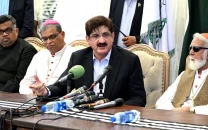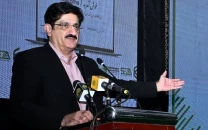What went wrong: Zamir Sheikh explains why revolutions failed
The book details history of progressive movements in the country and why they lacked lustre.

Sheikh said that he had initiated a debate. "The book will help researchers in the future." PHOTO: FILE
Progressive movements failed in Pakistan not because they lacked of ideology, but because of the deficit of true leadership. Revolutions are not brought about through crusades but through the mobilisation of people at the grassroots level.
"Communist parties in Pakistan did not make their own decisions but were being dictated," observed renowned historian Dr Mubarak Ali. "Success cannot be achieved without support from the people," he added, tracing the history of progressive movements in the country.
Dr Ali was speaking at the launching ceremony of the book titled What Went Wrong by journalist Zamir Sheikh.
The event was organised by the Literary Committee of the Karachi Press Club on Friday evening, where journalists, writers and political activists shared their points of view on progressive movements and their failures and achievements in the country. Dr Ali said that the image of communism was not positive in the past, but communist literature had gained popularity in Pakistan during Ayub Khan’s era.
"The people of Pakistan have always supported secular parties. Political parties have, however, supported right-wing parties," said journalist Mazhar Abbas.
He was of the view that the basic issues of the people would have been resolved by the Pakistan Peoples Party and the Pakistan Muslim League if foreign policy was not made on the directives of foreign powers. He claimed that extremism could be wiped out through fair politics.
The speakers claimed that political parties had finally come to own what they considered to be unacceptable in the past. "Those who criticised Faiz Ahmed Faiz and Habib Jalib consider them as their own poets today," said Dr Tauseef Ahmed.
"Closer ties with America didn't start in Pervez Musharraf's era, but in 1947," said Dr Ahmed, lamenting that rulers had carried on with such policies without considering the country's own issues.
Seasoned politician Mairaj Muhammad Khan said that communist movements failed in Pakistan when the Soviet Union and China stopped supporting them due to their own interests. "Revolutionary movements will continue till there is the issue of roti," he added.
He believed that the country was going towards a revolution. "People need a revolutionary party," he stressed. Khan said that all progressive political parties should convene a national conference and pave the way for a revolution.
"We criticise those who are still a part of the movement and don't blame those who left them halfway," lamented journalist Sohail Sangi. He said that the role of leaders in such movements was crucial for their success.
"Where are those movements that people strived for, for about 30 years? People's sacrifices in such movements were unforgettable," explained the author. "It (the book) is a tribute to those people."
Speaking to The Express Tribune, Sheikh said that he had initiated a debate. "The book will help researchers in the future."
Muslim Shamim, a well-known author, was of the view that writers and poets of such movements played their role, saying that it was not the progressive movements that failed, but the people.
The speakers appreciated Sheikh and said that a new debate had been initiated with the arrival of the book. "Not only does it disseminate information, the book also helps understand the problems associated with progressive movements," said another speaker, Riaz Sheikh.
Published in The Express Tribune, March 30th, 2014.



















COMMENTS
Comments are moderated and generally will be posted if they are on-topic and not abusive.
For more information, please see our Comments FAQ